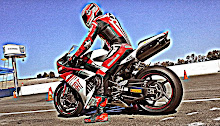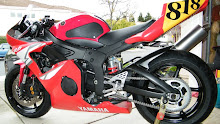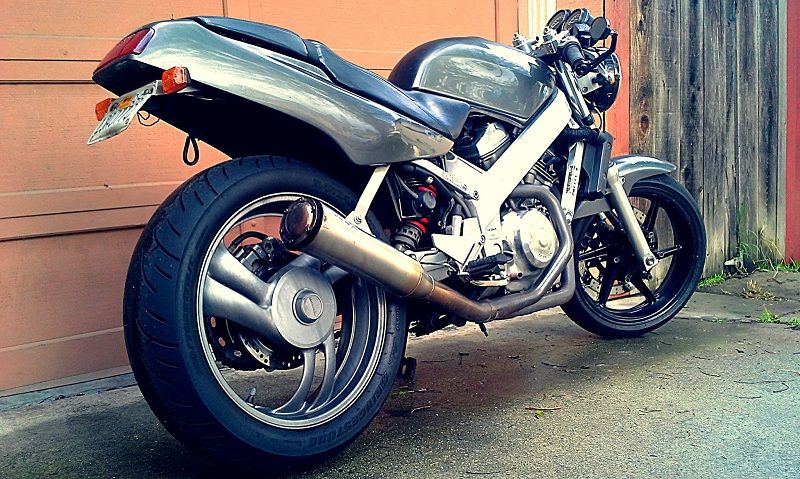Two days ago I visited Thunderhill again for an open trackday held by Kneeriders, one of countless trips I've made to that track which has long become my favorite playground. I got most of my riding done about an hour or two before the track closed, so I slipped off my leathers and took to the stands closest to the Turn 1 entry to watch the rest that were still out there, including Joe and Toe dicing it up with one another after a day of photographing the rest of us. Those fuckers came on when I decided to come off, cause I would've loved to play along with them. Next time.
There was already a spectator at the stands when I got there, a very pleasant woman, perhaps in her late 40's, watching her son Brandon enjoying his 3rd track day ever. Thinking back now, I can't really remember what her name was, but let's just call her "Jackie."I opened up our conversation by stating how watching at the sidelines makes the on-track activity seem so insane, with bikes and riders flying at a high rate of speed, and yet when you're on board the machines, it all seems so natural to be doing that. It's a genuine observation on my part, cause that's how I always feel about track riding when watching in the sidelines, but in some ways I guess it was my way of assuring her that there's a level of control from a rider operating the machine. It's controlled chaos.
Jackie then asked me if dragging your knee was a goal for track riding. All I could offer was perhaps it was to some people. I told her that to some, that may be enough. It looks cool, it feels cool, and to some, there's nothing more beyond that. To others however, it's a tool towards a more substantial goal. The bigger goal is beyond the knee touching the ground, but as a result of attaining or working towards that goal (i.e. going faster), your knee inevitably meets it.
Jackie tells me that Brandon had just taken up riding two years ago, but has since made it his religion. Brandon's been taken under the wing of some of the Sacramento area's riders to better learn the craft, some of which comprise the Kneeriders group. I told Jackie that that is a good thing, as one of the most common traits found with riding enthusiasts is the genuine willingness to offer what they can to other riders to make sure they enjoy a lasting riding life. The only thing I imparted to Jackie was the necessity to be cognizant of those that intend well, because despite others' well wishes, unfortunately their advices are not always sourced from sound experience. I told her that it's not uncommon to meet a rider who has had an enduring riding life, despite perhaps not practicing sound riding principles; it's just how it is. It's Brandon's job to be aware and to discern a good source of information for him to learn from, and to be able to set aside people's best intents from their potentially bad advices.
There are a lot of ways to teach and a lot of ways to learn that information is surely never lacking, but can commonly be misguided. As a practitioner of this craft (or any craft), it's not enough to just soak information. You have to also screen them out as best as you can to weed out what is unnecessary or misinforming. In some ways, to better learn you have to be an even better teacher to yourself. What works for one may not work for another, and what's been working this entire time may not be a testament to skill, but perhaps to luck.
This is basically where I am trying to get at, that you can't just be an open mouth ready to be fed. Keep your eyes and ears open, and learn on your own as much as you are willing to be taught. A lot of people have devoted a lot of their time thinking about this sport, and a lot of people have devoted their time living this sport. There are those that do both, thinking while they are living this, critically analyzing every moment they are on top of their machines either in the mountain roads or the race track. All can be generous wells of knowledge, and all equally able to disseminate ill-advices. Perhaps it's in the message itself, or their inability to convey it properly, leaving you with less questions than answers by the time they stop talking.
By any means, I'm not saying that you should let things go in one ear and out the other, but instead by very discriminate of what should stay with you, and what should be left behind.
YOU should have YOUR best interests at heart more than anybody else, and therefore as a learner, YOU must be your foremost teacher. Because at the end of the day, even if you meet the most sound and intelligent teachers of this sport, you can't bring them home with you, or have them with you in every ride that you do for the rest of your life. It always comes down to you. The duty to constantly learn and to constantly be taught will always fall on you.
I think that if I'm ever going to have credit to impart anything, this would have been it anyway. So hopefully this was helpful to some, but if you don't think so, then that's great. Cause you've just done that which was what I wanted you to do:
Discern.
Ride safe!
skip to main |
skip to sidebar


in chronolical order, latest to earliest



Retired. Now the TAAF Bike









>> where all things moto and French Bulldog collide
(mostly moto)
About Me
- Dusty
- "Without passion, man is a mere latent force and possibility, like the flint which awaits the shock of the iron before it can give forth its spark." - Henri Frederic Amiel
Remember to live a life you would die for. If you survive it, you won. If it kills you, you didn't lose.
Dusty's Other Pages
Dusty Currently Rides:
-
The TAAF Bike has been sponsored by:
Earthquake Produce
Hope Custom Paint
BayAreaRidersForum.com
Ace Custom Graphics
Stikka Foo Signs & Graphics
Evolution Suspension
Spin-Tek, Inc.
Hope Custom Paint
BayAreaRidersForum.com
Ace Custom Graphics
Stikka Foo Signs & Graphics
Evolution Suspension
Spin-Tek, Inc.
2007 French Bulldog

Dusty Used to Ride:
2007 Yamaha R1 (track only)

1999 Triumph Speed Triple

2002 Yamaha R1

Retired. Now the TAAF Bike
2005 Yamaha R6 (track only)

2006 Yamaha WR250F

2002 Kawasaki ZX6R (track only)

2000 Aprilia RSV Mille

(on the track)

1996 Kawasaki ZX7R

1980 Kawasaki KZ550

1995 Yamaha YZF600

2006 Kawasaki EX500




